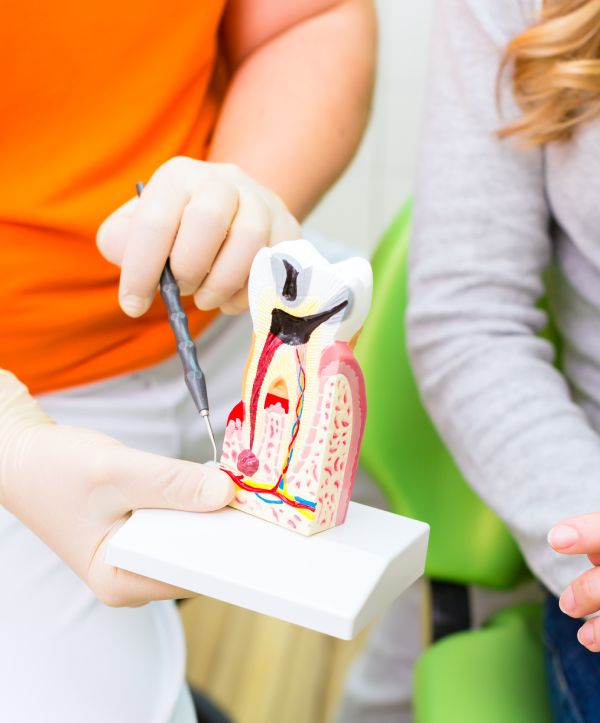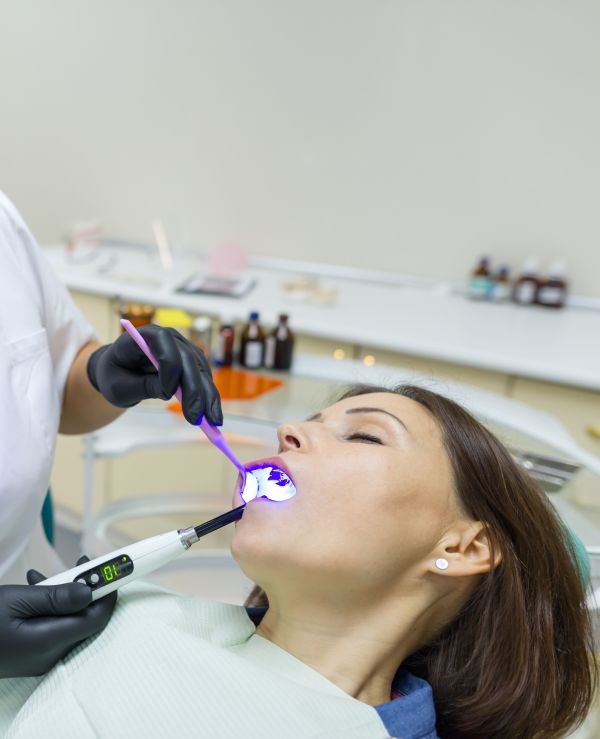New Westminster City Dentist
Root Canals in New Westminster
New Westminster City Dentist
Root Canals Therapy Near You
When the interior of your tooth becomes damaged or infected, your dentist will perform a procedure called a root canal. While some individuals are apprehensive about a root canal procedure, this treatment is completely safe and effective. Root canals are commonly used to treat the pulp inside the tooth, which has become infected or inflamed, in order to save the natural tooth and prevent a full extraction.
Signs You Might Need a Root Canal
There are several signs that might signal that you have an abscessed tooth. These include:
- Discomfort while biting or chewing
- Sensitivity to hot and cold foods
- Constant pain
- Swollen gums
- Tooth discolouration
If you suffer from one or more of these symptoms, it is important to book an appointment with your dentist. Early detection is crucial to maintain the integrity of your teeth and your oral health.
Why Do I Need a Root Canal?
The space inside the tooth is made up of the root canal system. This system is made up of pulp, which comprises nerves and blood vessels that provide nutrients for your tooth. Bacteria can enter the pulp through cavities in the teeth and cause the pulp to become infected. The result is an abscessed tooth. If you fail to take care of an abscessed tooth, the infection may spread to the other healthy teeth, and you may end up losing the tooth altogether.
Should I have a Root Canal or an Extraction?
Removing and then replacing a tooth requires more intensive treatment and can also be costly. Wherever possible, we advise treatment that will preserve your natural teeth. In the early stages of dental pulp infection, a root canal is the recommended form of treatment. It is a fairly simple and straightforward procedure that will return your tooth to health.
Problems tend to arise when an infection is left to linger for a long time, so it is best to treat the problem as soon as it is diagnosed.
What Is a Root Canal Procedure?
During the root canal procedure, your dentist will:
- Drill a hole into the tooth so they can access the damaged pulp.
- They will then remove the damaged pulp and clean out the area to remove any bacteria.
- After cleaning, your dentist will fill and seal the canal.
- They will seal the tooth with a temporary or permanent filling.
How Will My Tooth Look After Treatment?
If an abscessed tooth is diagnosed early, it is easier to fix, so your tooth is easily restored. However, if the infection is left to fester for a long period of time, this can cause irreversible damage to the tooth. Your dentist may have to remove part of the tooth structure and replace it using a crown.
Sedation Techniques For a Root Canal
Your dentist will typically administer a local anesthetic to numb the area during a root canal. However, for patients who become nervous or anxious about dental procedures, there are several conscious sedation methods that can help you relax.
Nitrous Oxide
Nitrous oxide, which is also known as laughing gas, can help you relax during the procedure. You’ll inhale the nitrous oxide using a mask and will typically feel the relaxing effects within minutes. Nitrous oxide offers the benefit of leaving the bloodstream quickly so you are able to drive home after your appointment.
Oral Sedation
Oral sedation is administered in pill form and taken about an hour before the procedure to give the sedation enough time to kick in. Oral sedation can make you feel tired, and some patients experience an amnesiac effect. For patients who suffer from major fear of the dental chair, oral sedation can help to lessen the intensity of the procedure. The effects of oral sedation take longer to wear off, so you will need a driver to accompany you to and from your appointment.
Care After Your Root Canal
Once the root canal is complete, your dentist will likely strengthen your remaining tooth with a crown. It is important to follow your dentist’s instructions following a root canal procedure. Generally, we recommend that you avoid eating hard or chewy foods that may cause damage to your new crown or pressure on the roots.
Continued Oral Care
As normal, you should brush your teeth twice a day, but be careful when cleaning around the area where the root canal was performed. If any symptoms seem to worsen after treatment, or you suffer from increasing pain or blood in your saliva, make sure to call your dentist.
How To Prevent A Root Canal
The best way to prevent a root canal is to practice good dental hygiene. Brush your teeth twice a day and floss your teeth daily. Avoid sugary drinks and food that can cause cavities in your teeth.
It is important to visit your dentist regularly for an oral exam. They can check your teeth for early signs of a cavity and use digital x-ray technology to identify any abscesses within the tooth.




